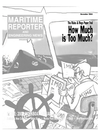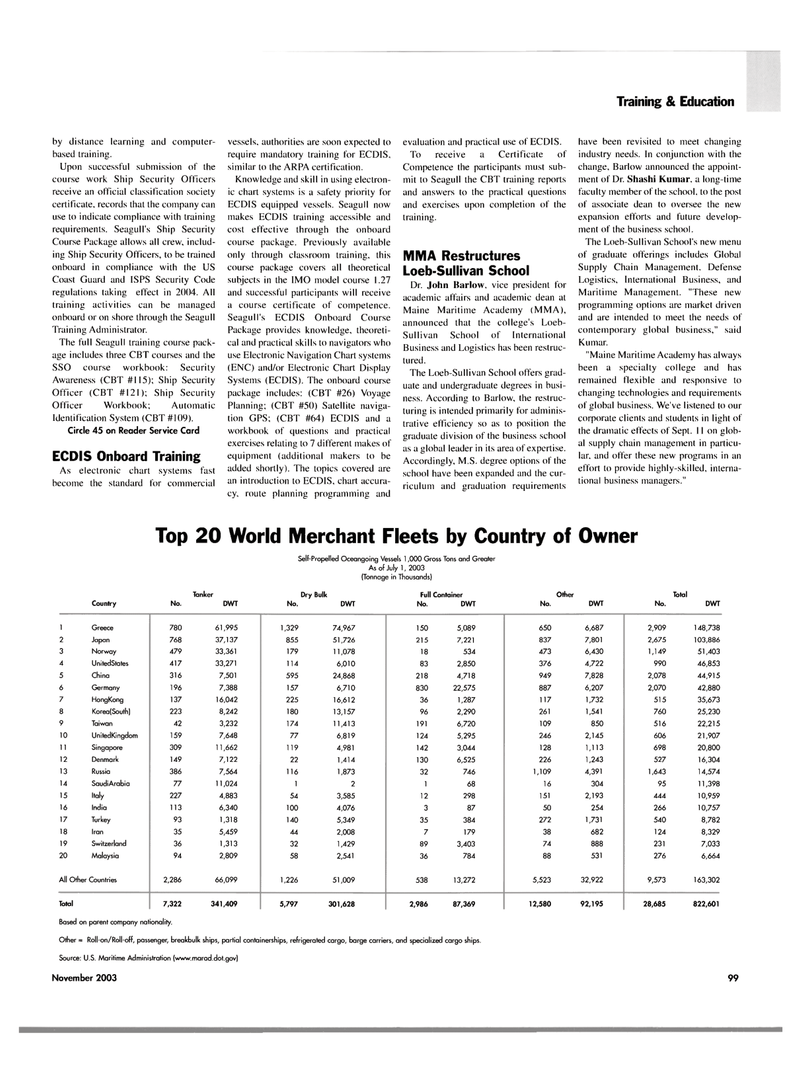
Page 102: of Maritime Reporter Magazine (November 2003)
Read this page in Pdf, Flash or Html5 edition of November 2003 Maritime Reporter Magazine
Training & Education by distance learning and computer- based training.
Upon successful submission of the course work Ship Security Officers receive an official classification society certificate, records that the company can use to indicate compliance with training requirements. Seagull's Ship Security
Course Package allows all crew, includ- ing Ship Security Officers, to be trained onboard in compliance with the US
Coast Guard and ISPS Security Code regulations taking effect in 2004. All training activities can be managed onboard or on shore through the Seagull
Training Administrator.
The full Seagull training course pack- age includes three CBT courses and the
SSO course workbook: Security
Awareness (CBT #115); Ship Security
Officer (CBT #121); Ship Security
Officer Workbook; Automatic
Identification System (CBT #109).
Circle 45 on Reader Service Card
ECDIS Onboard Training
As electronic chart systems fast become the standard for commercial vessels, authorities are soon expected to require mandatory training for ECDIS. similar to the ARPA certification.
Knowledge and skill in using electron- ic chart systems is a safety priority for
ECDIS equipped vessels. Seagull now makes ECDIS training accessible and cost effective through the onboard course package. Previously available only through classroom training, this course package covers all theoretical subjects in the IMO model course 1.27 and successful participants will receive a course certificate of competence.
Seagull's ECDIS Onboard Course
Package provides knowledge, theoreti- cal and practical skills to navigators who use Electronic Navigation Chart systems (ENC) and/or Electronic Chart Display
Systems (ECDIS). The onboard course package includes: (CBT #26) Voyage
Planning; (CBT #50) Satellite naviga- tion GPS; (CBT #64) ECDIS and a workbook of questions and practical exercises relating to 7 different makes of equipment (additional makers to be added shortly). The topics covered are an introduction to ECDIS, chart accura- cy. route planning programming and evaluation and practical use of ECDIS.
To receive a Certificate of
Competence the participants must sub- mit to Seagull the CBT training reports and answers to the practical questions and exercises upon completion of the training.
MMA Restructures
Loeb-Sullivan School
Dr. John Barlow, vice president for academic affairs and academic dean at
Maine Maritime Academy (MMA), announced that the college's Loeb-
Sullivan School of International
Business and Logistics has been restruc- tured.
The Loeb-Sullivan School offers grad- uate and undergraduate degrees in busi- ness. According to Barlow, the restruc- turing is intended primarily for adminis- trative efficiency so as to position the graduate division of the business school as a global leader in its area of expertise.
Accordingly, M.S. degree options of the school have been expanded and the cur- riculum and graduation requirements have been revisited to meet changing industry needs. In conjunction with the change. Barlow announced the appoint- ment of Dr. Shashi Kumar, a long-time faculty member of the school, to the post of associate dean to oversee the new expansion efforts and future develop- ment of the business school.
The Loeb-Sullivan School's new menu of graduate offerings includes Global
Supply Chain Management. Defense
Logistics, International Business, and
Maritime Management. "These new programming options are market driven and are intended to meet the needs of contemporary global business," said
Kumar. "Maine Maritime Academy has always been a specialty college and has remained flexible and responsive to changing technologies and requirements of global business. We've listened to our corporate clients and students in light of the dramatic effects of Sept. 11 on glob- al supply chain management in particu- lar. and offer these new programs in an effort to provide highly-skilled, interna- tional business managers."
Top 20 World Merchant Fleets by Country of Owner
Country No.
Tanker
DWT
Self Propelled Oceangoing Vessels 1,000 Gross Tons and Greater
As of July 1, 2003 (Tonnage in Thousands)
Dry Bulk Full Container
No. DWT No. DWT
Otfier
No. DWT No.
Total
DWT 1 Greece 780 61,995 1,329 74,967 150 5,089 650 6,687 2,909 148,738 2 Japan 768 37,137 855 51,726 215 7,221 837 7,801 2,675 103,886 3 Norway 479 33,361 179 11,078 18 534 473 6,430 1,149 51,403 4 UnitedStates 417 33,271 114 6,010 83 2,850 376 4,722 990 46,853 5 China 316 7,501 595 24,868 218 4,718 949 7,828 2,078 44,915 6 Germany 196 7,388 157 6,710 830 22,575 887 6,207 2,070 42,880 7 HongKong 137 16,042 225 16,612 36 1,287 117 1,732 515 35,673 8 Korea(South) 223 8,242 180 13,157 96 2,290 261 1,541 760 25,230 9 Taiwan 42 3,232 174 11,413 191 6,720 109 850 516 22,215 10 UnitedKingdom 159 7,648 77 6,819 124 5,295 246 2,145 606 21,907 11 Singapore 309 11,662 119 4,981 142 3,044 128 1,113 698 20,800 12 Denmark 149 7,122 22 1,414 130 6,525 226 1,243 527 16,304 13 Russia 386 7,564 116 1,873 32 746 1,109 4,391 1,643 14,574 14 SaudiArabia 77 11,024 1 2 1 68 16 304 95 11,398 15 Italy 227 4,883 54 3,585 12 298 151 2,193 444 10,959 16 India 113 6,340 100 4,076 3 87 50 254 266 10,757 17 Turkey 93 1,318 140 5,349 35 384 272 1,731 540 8,782 18 Iran 35 5,459 44 2,008 7 179 38 682 124 8,329 19 Switzerland 36 1,313 32 1,429 89 3,403 74 888 231 7,033 20 Malaysia 94 2,809 58 2,541 36 784 88 531 276 6,664
All Other Countries 2,286 66,099 1,226 51,009 538 13,272 5,523 32,922 9,573 163,302
Total 7,322 341,409 5,797 301,628 2,986 87,369 12,580 92,195 28,685 822,601
Based on parent company nationality.
Other = Roll-on/Roll-off, passenger, breakbulk ships, partial containerships, refrigerated cargo, barge carriers, and specialized cargo ships.
Source: U.S. Maritime Administration (www.marad.dot.gov)
November 2003 99

 101
101

 103
103
